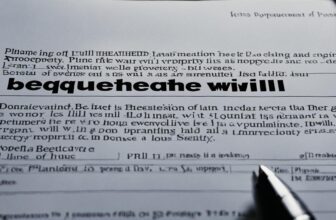
Every individual has unique wishes and goals when it comes to their estate plan, making the process of estate planning a deeply personal journey. At the core of any comprehensive estate plan is the drafting of a sound last will and testament, which serves as the foundation for how assets are to be managed and distributed upon one’s passing. By ensuring that every detail of your estate, from asset lists to wishes on inheritance, is thoroughly accounted for, you can create a lasting legacy that precisely reflects your intentions and values.
Not only does a well-crafted will prevent potential chaos caused by misunderstandings, but it can also help provide peace of mind for both you and your loved ones. This article will delve into the intricacies of estate wills, providing insights on the importance of a well-structured will, the role of estate attorneys, and strategies for effective inheritance planning. By the end, you will have a deeper understanding of how to successfully craft a robust estate plan that aligns with your unique needs and goals.
Understanding the Importance of a Well-Structured Estate Will
A well-structured estate will plays a pivotal role in preserving one’s legacy and ensuring a smooth transfer of assets to heirs, minimizing the risk of misinterpretation, miscommunication, and unintended consequences. By diligently planning every aspect of your will and seeking guidance from experienced estate attorneys during the process, you can create an estate plan that accurately represents your intentions and fulfills your wishes for your loved ones.
Preventing Misinterpretation and Miscommunication
Estate disputes often arise due to ambiguities or inconsistencies in will documents. Such issues can leave room for individual biases, leading to complications in probate court and strife among beneficiaries. To prevent this, enlisting the help of a trust attorney or estate attorney during your will planning can ensure that your decisions and directives are clear, concise, and legally sound. By leaving no stone unturned, you minimize the chances of misinterpretation and the resulting conflicts and unintended outcomes.
Ensuring Your Legacy Through Clarity in Your Will
Creating a clear and comprehensive will is vital to ensure that your legacy is accurately represented and honored. Writing in plain English what you wish to accomplish with your estate, updating statements to reflect discussions with an attorney, and aligning your goals and outcomes is key to achieving this.
Living wills are essential for outlining your medical care preferences and end-of-life care decisions, providing clear instructions for your loved ones to follow. An estate attorney can guide you through crafting a living will that truly reflects your wishes, alleviating the burden on your family during difficult times.
By investing time and effort in will planning and seeking the expertise of estate planning professionals, you can create a well-structured estate plan that ensures your legacy is preserved and your estate is transferred to your loved ones in accordance with your intentions.
Selecting the Right Estate Attorney for Your Will Preparation

One of the most critical steps in estate will preparation is finding the right estate attorney. Choosing the right attorney can have a significant impact on the accuracy and effectiveness of your finalized estate plan. With numerous probate lawyers and estate attorneys in the market, selecting the best one may seem daunting, but by focusing on key factors, you can make an informed decision.
Gauging Your Lawyer’s Inquisitiveness and Solutions
A proficient estate attorney should be inquisitive about your assets and estate goals. They should ask pertinent questions, assess potential issues, and showcase extensive knowledge in the estate wills field. More specifically, consider evaluating their ability to present multiple solutions, explain trade-offs, and provide guidance in navigating various legal complexities surrounding will preparation.
Why Your Lawyer’s Approach to Your Estate Goals Matters
Aside from technical expertise, your lawyer’s approach towards your estate goals can greatly influence the success of your plan. A lawyer who is thorough, adaptable, and aligned with your estate objectives will be more suited to develop a sound plan that truly reflects your wishes. When selecting an estate attorney, ensure they have clear communication skills, demonstrate empathy, and prioritize your goals throughout the process.
In conclusion, thoughtful selection of an estate attorney will significantly improve your estate will preparation experience. A reputable attorney will not only be proficient in the intricacies of estate planning but should also adopt an approach that genuinely supports your estate objectives. By prioritizing these factors, you can trust that your attorney will create an estate plan that truly represents your desires and safeguards your assets for the future.
Communicating Your Estate Planning Goals Effectively

Estate planning is a crucial aspect of preparing for the future and ensuring the proper distribution of your assets after your passing. Effective estate planning requires clear and concise communication of your goals and legacy. Two key elements in achieving this are expressing your intentions in plain English and aligning with your legal counsel to produce a well-crafted estate will that accurately represents your wishes.
Conveying Your Legacy: Writing Your Intentions in Plain English
When working on your estate wills, it is imperative to express your intentions and desires for your legacy in a clear and comprehensible manner. Writing in plain English enables you and your estate attorney to understand the objectives and ensures that the resulting documents are accessible to all parties involved. Updating written statements throughout the will preparation process fosters a smooth execution and helps minimize the possibility of confusion or misinterpretation.
The Significance of Lawyer-Client Alignment in Estate Planning
Establishing a strong working relationship with your estate attorney is critical to the success of your estate plan. This collaboration ensures that your estate wills accurately reflect your wishes and protects against potential conflicts during the execution of the will. A lawyer-client alignment enables both parties to anticipate any issues that may arise and devise appropriate solutions, ultimately leading to a well-structured and robust estate plan.
The Role of Second Opinions in Solidifying Estate Wills

While estate wills are crucial to ensuring that your final wishes are fulfilled, obtaining a second opinion on your will can be invaluable to avoid common pitfalls in the planning process. Drawing on the expertise of another estate attorney can help you gain a thorough understanding of the complexities surrounding wills and trusts and may even provide alternative perspectives that make your estate plan more robust.
Avoiding Common Pitfalls in Will Planning: The Value of Expert Review
When it comes to will planning, it’s not uncommon for individuals to inadvertently overlook essential components, such as bypass or credit shelter trust mistakes. These oversights can lead to additional taxes, which is why seeking expert review from a trust attorney can be so beneficial. By catching these errors before they become a problem, an attorney can help you avoid costly complications and ensure that your will remains a vital part of your estate plan.
Understanding the Complexities of Wills and Trusts Through Multiple Perspectives
Estate wills can be incredibly complex, and successfully navigating these complexities requires not only a deep understanding of the law but also an ability to view the situation from multiple perspectives. By seeking input from a second estate attorney, you can gain new insights and ideas that might not have occurred to you or your initial attorney. As a result, your estate plan is left stronger, more comprehensive, and better suited to meet your specific needs and wishes.
Assessing Family Dynamics and Impact on Your Estate Will

When crafting your estate will, it is vital to consider the intricacies of family dynamics that could potentially influence its execution. Whether you are deciding on an executor or pondering over possible complications among heirs, closely examining how relationships may impact the distribution of your assets is an essential aspect of estate planning and inheritance planning.
An in-depth understanding of your family’s unique history, which could include past rivalries or animosity between siblings, will allow you to create a tailored estate will that can mitigate the risk of disputes and maintain family harmony. In cases where existing differences might lead to escalated conflicts, it is often wise to appoint an outside party as executor. This third party is not personally involved in the family dynamics and can manage the estate with objectivity and impartiality.
Thorough estate planning not only involves allocating assets to heirs, but also requires the acknowledgment of potential challenges that may arise from family tensions. Incorporating strategies to address these challenges in your estate will is crucial in ensuring a smooth and conflict-free inheritance process.

When creating an estate will, it is essential to consider the implications of specific bequests and the use of the residuary clause. This helps to ensure a smooth inheritance process and successful distribution of assets per the individual’s wishes. In this section, we will discuss the importance of striking a balance between specific bequests and relying on the residuary clause.
Striking a Balance: When to Limit Specific Bequests
As a crucial part of inheritance planning, specific bequests allow the testator to leave specific assets or items to chosen beneficiaries. While this can be an effective way to distribute unique or valuable items, it may lead to constant updates and potential inequities if used excessively. To avoid these issues, it is important to limit specific bequests to truly unique or high-value assets and rely on other estate distribution strategies for the remaining assets.
The Advantages of Relying on the Residuary Clause
In situations where the estate owner prefers not to make numerous specific bequests, the residuary clause can be a valuable tool. The residuary clause tackles the challenge of distributing the remaining estate assets that were not explicitly bequeathed. Often, the residue of the estate is divided among spouses and children, providing a structured allocation of assets without the need for constant monitoring.
Utilizing the residuary clause allows for more flexibility in handling unforeseen changes in asset values or the addition of new assets to the estate. By providing a simple and comprehensive method of distribution, the residuary clause significantly simplifies the inheritance planning process and ensures that assets are managed effectively within the overall estate distribution plan.
Determining the Optimal Asset Distribution Method for Heirs

When planning the distribution of assets in an estate plan, it is essential to find the optimal method for your heirs. This involves considering individual circumstances and weighing the potential implications of using equal distribution versus tailored strategies.
Equal Distribution Versus Tailored Strategies
Equal distribution entails dividing the assets evenly among all beneficiaries, ensuring fairness and simplicity. On the other hand, tailored strategies take into account the unique needs, conditions, or preferences of the individual heirs, allowing for customized inheritance plans. When working with a trust attorney, it is crucial to examine the benefits and drawbacks of each method carefully.
Anticipating Heir Circumstances and Crafting Fair Distribution
To create an estate plan that maintains harmony and is perceived as fair, it is necessary to anticipate the circumstances of each beneficiary. For example, consider the financial stability, health, age, and other factors that may influence their needs and ability to manage the inheritance. Estate planning professionals can provide guidance and expertise when crafting a fair distribution plan that takes all relevant factors into account.
By thoughtfully weighing the pros and cons of various asset distribution methods and working closely with an experienced estate planning attorney, you can craft an estate plan that effectively meets the needs of your heirs and honors your wishes for the future.
Keeping Your Estate Plan Current: Adaptability to Change
An adaptable estate plan is crucial for ensuring that your plan remains reflective of your latest goals and circumstances. Keeping an estate plan current involves continuously monitoring family dynamics, wealth, and residency changes and making necessary adjustments to maintain its accuracy and effectiveness. By working closely with an estate attorney and updating your plan in a timely manner, you help protect your legacy and ensure a smooth estate administration process for your heirs.
Monitoring Family and Wealth Changes: Timely Estate Plan Updates
Various life events, such as the birth or death of family members, marriages, divorces, or significant changes in assets, may require updates to your estate plan to ensure its continued relevance. Regular consultations with an estate attorney can provide valuable insights and guidance when adapting your plan based on these changes. This proactive approach to estate planning ensures that your will, trusts, or other estate planning instruments accurately reflect your current intentions and wishes.
Impact of Relocation and Asset Shifts on Estate Plans
Relocating to a new state or country, or experiencing substantial shifts in your assets, can impact your estate plan significantly. Different jurisdictions may have differing laws and tax implications that necessitate revisions to your plan. Estate attorneys well-versed in cross-jurisdictional issues can help you navigate these complexities and ensure your estate plan remains compliant with the applicable laws and regulations.
Ultimately, embracing adaptability in your estate planning process is essential in preserving your legacy and easing the administration of your estate after your passing. By continuously reviewing and updating your estate plan in response to significant life changes, you can provide peace of mind to both yourself and your loved ones.
Establishing a Clear Domicile to Avoid Estate Tax Conflicts

Estate tax conflicts can be mitigated by clearly establishing domicile in a particular state. The legal definition of domicile typically involves the intent to reside indefinitely in a location, which can affect the taxation of an estate upon death. To prevent multiple states from levying full taxes on an estate, it is imperative to legally establish and document domicile, focusing on voter registration, vehicle registration, driver’s license addresses, and other residency factors.
Inheritance planning should account for the potential impact of estate taxes, which can vary significantly depending on the state in which an individual resides. By establishing a clear and well-documented domicile, individuals can ensure that their estate will be subject to the appropriate tax rates and avoid potential disputes with tax authorities.
An estate planning attorney can provide essential guidance in determining the most beneficial domicile for mitigating estate tax conflicts. With a clear understanding of the regulations and requirements in each state, a legal expert can assist in navigating the complexities of establishing domicile and ensuring the smooth execution of an estate plan.
In conclusion, minimizing estate tax conflicts is an essential aspect of inheritance planning. By establishing a clear domicile and seeking the assistance of a knowledgeable estate planning attorney, individuals can protect their assets and ensure the fair distribution of their estate upon their passing.
Conclusion
Creating a comprehensive estate will is essential for anyone who wishes to leave a lasting legacy and ensure that their final wishes are fulfilled with precision and care. Estate planning is a complex and sensitive process, but by embracing it with confidence and recognizing the importance of clear communication, regular updates, and professional guidance, individuals can safeguard their wishes and provide peace of mind for both themselves and their loved ones.
Creating Lasting Legacies with Thorough Estate Wills
A well-crafted estate will serves as the cornerstone of a successful estate plan. With a thorough estate will in place, individuals can navigate the complexities of estate planning, inheritance, and asset distribution with ease. By selecting the right estate attorney, developing a clear understanding of family dynamics, and carefully considering the optimal asset distribution method for heirs, individuals can leave a lasting legacy while ensuring their estate is distributed according to their wishes.
Embracing the Journey of Estate Planning with Confidence
Estate planning is an ongoing process that requires adaptability to changes in family, wealth, and residency. By engaging in regular consultation with estate planning professionals, individuals can ensure that their estate plans remain up-to-date and reflective of their latest goals and circumstances. Staying abreast of legal considerations such as establishing a clear domicile and navigating the nuances of specific bequests and residuary clauses can further bolster the effectiveness of an estate plan, solidifying a secure future for one’s assets and loved ones.
FAQ
What components should be included in a well-structured estate will?
A well-structured estate will should include a clear and detailed list of assets, specific bequests, a residuary clause, and instructions for the distribution of the assets among the heirs. It should also take into consideration family dynamics and minimize the potential for misinterpretation and miscommunication.
How do I select the right estate attorney for my will preparation?
Look for an attorney who is inquisitive about your assets and goals and can present multiple solutions and explain tradeoffs. The attorney’s approach should be thorough, adaptable, and aligned with your estate goals. Seek recommendations from trusted sources and interview potential attorneys to evaluate if they are compatible with your needs.
Why is it important to obtain a second opinion for my estate will?
A second opinion can help avoid common pitfalls in the planning process and may offer alternative perspectives that enhance the effectiveness and robustness of your estate plan. Expert review from another estate attorney ensures a thorough understanding of the complexities of wills and trusts.
How can I ensure clear and effective communication of my estate planning goals?
Express your intentions in plain English and update written statements throughout the planning process. Align your understanding with that of your estate attorney, and make sure the final documents accurately reflect your wishes. Regular communication with your attorney will help minimize potential miscommunication and anticipate any issues that may arise in the execution of the will.
What is the importance of assessing family dynamics when crafting an estate will?
Understanding family dynamics can help anticipate potential conflicts among heirs and inform decisions like naming an executor. A careful assessment of family relationships and history can lead to a more harmonious distribution of assets and potentially reduce disputes and legal battles among family members after your passing.
What is the difference between equal and tailored asset distribution strategies?
Equal distribution involves distributing assets evenly among heirs, while tailored distribution takes into consideration the unique circumstances and needs of each heir. Both methods have their pros and cons, so it is essential to contemplate the specific needs and conditions of your beneficiaries when deciding on an asset distribution strategy.
How often should I update my estate plan?
You should update your estate plan regularly, especially in response to significant changes in family dynamics, wealth, or residency. Examples of major life events that warrant an update include the birth or death of family members, marriages, divorces, relocations, or significant asset sales. Regular consultation with your estate planner is key to maintaining an accurate and effective estate strategy.
Establish and document your legal domicile in a specific state by focusing on factors like voter registration, vehicle registration, driver’s license addresses, and documentation of intent to reside indefinitely in a location. This will help prevent multiple states from levying taxes on your estate upon your death.






